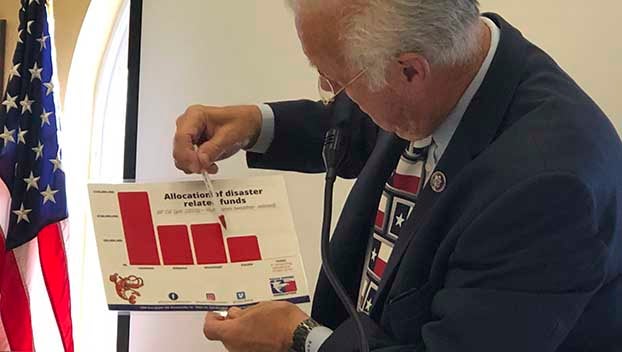MARY MEAUX — Rep. Weber continues to stand behind shrimping industry
Published 12:08 am Thursday, March 16, 2023

- Congressman Randy Weber describes a chart showing the difference in government funding by certain states at a Port Arthur Area Shrimpers Association meeting. (Monique Batson/The News"
|
Getting your Trinity Audio player ready...
|
Rep. Randy Weber is standing firm in his concerns for the shrimping industry.
On Jan. 17, Weber sent a joint letter to Secretary of Commerce Gina Raimondo and U.S. Trade Rep. Katherine Tai, asking for a response by Feb. 1.
As of March 14, having received no response, he reached out again.
“Shrimpers along the Gulf Coast have continued to be affected by imports, and each day that passes brings additional hardship,” the letter read. “While it is discouraging that no response has yet been received, we remain committed to working with your respective offices.”
The letter again requests a response, this time with an April 1 deadline. It is signed by Weber, Rep. Troy E. Nehls, Rep. Vicente Gonzalez, Rep. Clay Higgins, Rep. Garret Graves, and Rep. Neal Dunn.
Weber said the shrimping industry deserves answers from the federal government on issues impacting their way of life.
Back in mid-January, Weber, along with representatives of the Southern Shrimp Alliance, Sabine Pass Port Authority, Port Arthur Area Shrimpers Association and others met to discuss the issues at hand.
“People will pay more for domestic shrimp if there’s a demand for shrimp,” attorney Nathan Rickard, who represents the Southern Shrimp Alliance, said during the meeting in Port Arthur.
“When imported shrimp swamps the market to where we have more imported shrimp in the market then there is demand, domestic prices collapse to try and sell at what imported prices look like. So what we think is going to happen for 2023, is if the prices you have been receiving that are very low are going to continue to be low next year because of the amount of imports that are in place.”
Imported shrimp have reached nearly 1.8 million pounds annually and are worth almost $8 billion, he said.
The imported products sometimes do not meet the U.S.’s domestic health standards. It’s not unusual to find, during routine field inspections by the Food and Drug Administration, more than 10 percent of imported shrimp contain banned antibiotics used in aquaculture practices.
Now it’s a wait-and-see game.
“The shrimping industry deserves answers from the federal government on issues impacting their way of life,” Weber said. “My office, along with my colleagues in Congress, will continue to press Secretary Raimondo and Ambassador Tai to properly address our legitimate concerns about foreign countries using illegal trade practices.”
Mary Meaux is a news reporter at The Port Arthur News. She can be reached at mary.meaux@panews.com.





